


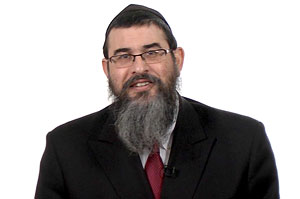
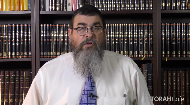 16:11
16:11
Rabbi Yossi Paltiel (56)
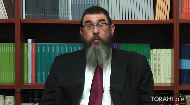 11:24
11:24
This final segment of the "Intro to Kabbalah" series introduces the Alter Rebbe, successor of the Baal Shem Tov and founder of the Chabad movement. It describes his revolutionary method of teaching Kabbalistic ideas with a philosophical form, using analogies from the human experience that even a non-mystic could relate to
Series: Intro To Kabbalah
Rabbi Yossi Paltiel (56)
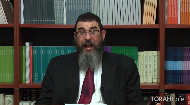 10:58
10:58
The Baal Shem Tov’s success as a leader was not in writing books, but in touching souls and igniting within them a fire of passion above diligence and faith above reason. This episode of Rabbi Paltiel’se series on the development of Kabbalah shifts into describing the founding of the Chassidic movement by the Baal Shem Tov
Series: Intro To Kabbalah
Rabbi Yossi Paltiel (56)
 6:31
6:31
Rabbi Shaya Halevi Horowitz, also known as the Shaloh, was a prolific writer of Kabbalah, following the legacy of the Arizal. This episode of Rabbi Paltiel's Intro to Kabblah series discusses his classic book, Shnei Luchot Habrit, which was left as a testament for his family before his passing and was never meant to be published
Series: Intro To Kabbalah
Rabbi Yossi Paltiel (56)
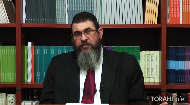 7:13
7:13
This segment of Rabbi Paltiel's series on the historical development of Kabbalah discusses how the teachings of the Arizal were recorded. Rabbi Chaim Vital is known as his most prominent student and was appointed by the Arizal himself to transcribe his profound teachings
Series: Intro To Kabbalah
Rabbi Yossi Paltiel (56)
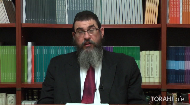 17:14
17:14
In this segment of the series “Intro to Kabbalah,” Rabbi Yossi Paltiel examines the life and personality of the Arizal - Rabbi Yitzchak Luria Ashkenazi, father of Lurianic Kabbalah. The Arizal is the famed student of Rabbi Moshe Cordovero, and upon the death of his teacher, he undisputedly filled the position as head of the Kabbalists
Series: Intro To Kabbalah
Rabbi Yossi Paltiel (56)
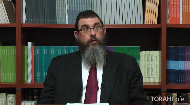 10:36
10:36
The Ramak was a copious writer of mysticism who lived in Safed during its golden era. His writings are the first to suggest reconciliation between the works of Maimonides and Kabbalah
Series: Intro To Kabbalah
Rabbi Yossi Paltiel (56)
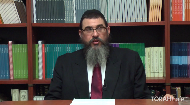 11:01
11:01
Thousands of books of Kabbalah have been written over the centuries, but a few stand out as the most prominent and widespread. In this section of his “Intro to Kabbalah” series, Rabbi Paltiel begins with describing the Avodat Hakodesh as a comprehensive outline of the goals, framework and methodology of Kabbalah
Series: Intro To Kabbalah
Rabbi Yossi Paltiel (56)
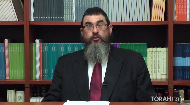 13:55
13:55
The re-appearance of the Zohar during the middle ages led to much controversy over its authenticity and how it would affect Jewish practice. This intriguing segment in Rabbi Yossi Paltiel’s “Intro to Kabbalah” deals with the discovery of what was claimed to be salvaged remnants of the ancient Zohar
Series: Intro To Kabbalah
Rabbi Yossi Paltiel (56)
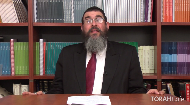 14:59
14:59
Nachmanides appeared on the scene of Jewish mysticism following the prediction of Maimonides for a return of prophecy. He became a famous mystic upon moving to the land of Israel, making the holiness of the land a central theme in many of his writings
Series: Intro To Kabbalah
Rabbi Yossi Paltiel (56)
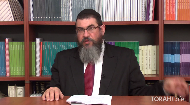 13:05
13:05
The Zohar is famous for being a primary text of Kabbalah. There has, however, been much controversy over the origin and authenicity of the Zohar
Series: Intro To Kabbalah
Rabbi Yossi Paltiel (56)
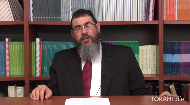 15:18
15:18
After the passing of a generation of mystics and the disappearance of the Zohar, a dark age of Kabbalah ensues. As part of his series “Intro to Kabbalah”, Rabbi Yossi Paltiel describes the small trickle of mystics who carried the torch of kabbalah from the times of the Rashbi until the re-emergence of the Zohar
Series: Intro To Kabbalah
Rabbi Yossi Paltiel (56)
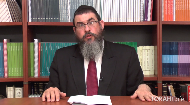 14:42
14:42
To study Kabbalah is a delicate exercise. For some Jewish leaders, this pointed to a major concern
Series: Intro To Kabbalah
Rabbi Yossi Paltiel (56)
 20:10
20:10
There was one era in history in which a shift occurred that was so magnanimous, it changed the face of Jewish life forever. This shift was executed under the guidance of the Men of the Great Assembly. With the spiritual sensitivity of the Jews decreasing, these bold men sensed the need for change
Series: Intro To Kabbalah
Rabbi Yossi Paltiel (56)
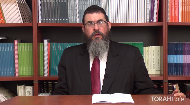 15:25
15:25
What qualifies a person to be a prophet? Aside from being an upright and refined person, a prophet is a spiritually sensitive human being. For most of early Jewish history, the spiritual leaders were prophets
Series: Intro To Kabbalah
Rabbi Yossi Paltiel (56)
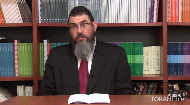 18:56
18:56
Kabbalah is thought to have roots as old as Judaism itself. In this fascinating new series, Rabbi Yossi Paltiel uncovers the origin of Jewish mysticism and traces its development throughout Jewish history. In this first installment, we learn about the mystics' deep and enriching approach to Torah learning and observance
Series: Intro To Kabbalah
Rabbi Yossi Paltiel (56)
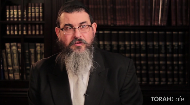 7:56
7:56
Everyone knows what to do when Haman’s name is read - we bang, we boo, and make noise. What kind of game are we playing? Discover why we take our Purim noise-making so seriously in this short talk by Rabbi Yossi Paltiel.
Series: Extreme Purim
Rabbi Yossi Paltiel (56)
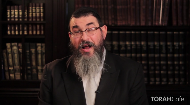 4:59
4:59
Series: Extreme Purim
Rabbi Yossi Paltiel (56)
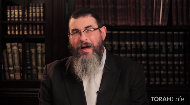 4:17
4:17
Series: Extreme Purim
Rabbi Yossi Paltiel (56)
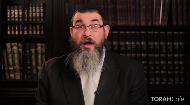 3:02
3:02
Series: Extreme Purim
Rabbi Yossi Paltiel (56)
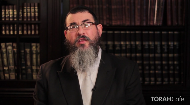 5:04
5:04
Series: Extreme Purim
Rabbi Yossi Paltiel (56)
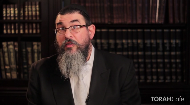 9:30
9:30
Series: Extreme Purim
Rabbi Yossi Paltiel (56)
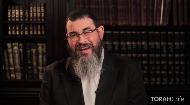 9:24
9:24
Series: Extreme Purim
Rabbi Yossi Paltiel (56)
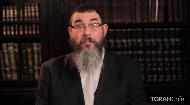 4:32
4:32
Did you ever wonder why Judaism places so much emphasis on dressing up for Purim? In this short talk, Rabbi Yossi Paltiel explains the deeper meaning behind the holiday of costumes and masquerades. Ultimately, the reason we dress up is to make the point that things are never as they seem. On a surface level, the plot of the Purim story reads like a bad joke
Series: Extreme Purim
Rabbi Yossi Paltiel (56)
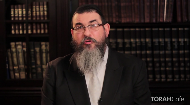 9:21
9:21
Series: Extreme Purim
Rabbi Yossi Paltiel (56)
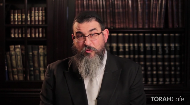 9:08
9:08
Series: Extreme Purim
Rabbi Yossi Paltiel (56)
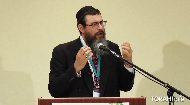 57:53
57:53
Discover how prayer holds the tools for developing a personal relationship with our Creator. Prayer is a ladder that reaches to heaven. Learn how to climb its rungs until you attain an intimate connection with G-d. This lecture was delivered at the 8th annual National Jewish Retreat. For more information and to register for the next retreat, visit: Jretreat.com.
Rabbi Yossi Paltiel (56)
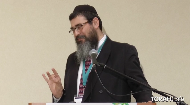 35:23
35:23
Real Chassidus for real living. In this lecture, Rabbi Yossi Paltiel, an expert in Chassidic philosophy, offers a poignant presentation about the anatomy and nature of the soul. He provides a step by step guide for self-improvement that can be applied in a real and practical way in one’s day to day life. .
Rabbi Yossi Paltiel (56)
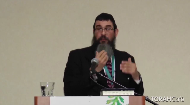 28:56
28:56
If you’re not moving forward, you’re falling backwards. Just as in business, our personal lives must always be evolving and growing. Concealed at the heart of Chassidic philosophy is a chart for progress that lays out humanity’s mandate to set ambitious goals. This study of the source texts translates the abstract ideals into a real and relevant plan for growth.
Rabbi Yossi Paltiel (56)
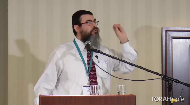 56:29
56:29
Here’s a chance to demystify the Jewish calendar and master its deeper meaning. Why don’t we just follow the secular calendar? Why do we glorify the moon? This class dissects the inner workings of the Jewish calendar to reveal the precision and certainty that it gives our year and our lives.
Rabbi Yossi Paltiel (56)
 2:20
2:20
Rabbi Yossi Paltiel (56)
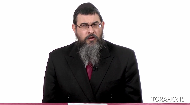 15:52
15:52
Rabbi Yossi Paltiel (56)
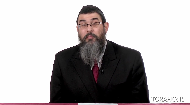 5:02
5:02
Rabbi Yossi Paltiel (56)
 3:42
3:42
Rabbi Yossi Paltiel (56)
 6:15
6:15
We're all aware of the "Four Sons" addressed in the Haggadah, but did you know that there's a fifth son as well?.
Rabbi Yossi Paltiel (56)
 3:13
3:13
Rabbi Yossi Paltiel (56)
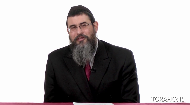 2:30
2:30
Rabbi Yossi Paltiel (56)
 3:27
3:27
Rabbi Yossi Paltiel (56)
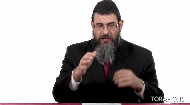 3:36
3:36
Rabbi Yossi Paltiel (56)
 6:20
6:20
“Seder” means “order”, and “Pesach” means to “jump over” which connotes a lack of order. How do we reconcile this contradiction?.
Rabbi Yossi Paltiel (56)
 6:01
6:01
Rabbi Yossi Paltiel (56)
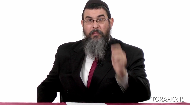 2:40
2:40
How have we made G-d happy by completing the seder? Rabbi Yossi Paltiel completes his commentary on the seder with the 4th cup and the hope you were able to enjoy your seder with family and friends, contemplating and talking about the story and the meanings behind it.
Series: Haggadah Insights
Rabbi Yossi Paltiel (56)
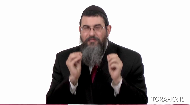 2:39
2:39
We're coming down the home stretch, so what are these pages of Psalms for? Rabbi Yossi Paltiel reminisces about his childhood experiences at this part of the seder. Hallel celebrates the personal, family and communal redemptions that we are waiting for.
Series: Haggadah Insights
Rabbi Yossi Paltiel (56)
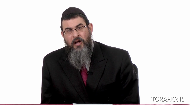 2:52
2:52
Blessings after meals are a part of everyday life, why is this night different? Rabbi Yossi Paltiel introduces the 3rd cup and brings in the spiritual aspects of grace after meals, thanking G-d for the ordinary things in our lives.
Series: Haggadah Insights
Rabbi Yossi Paltiel (56)
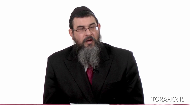 3:12
3:12
The Afikomen is the uncovering of the hidden, representing the rewards to come in the future. Rabbi Yossi Paltiel describes the procedure with the afikomen and the spiritual background behind it.
Series: Haggadah Insights
Rabbi Yossi Paltiel (56)
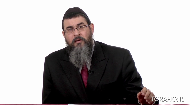 2:47
2:47
We finally get to eat, but is there room? It is holy to enjoy the meal, but remember more matzah is coming. Rabbi Yossi Paltiel describes what is required for the meal, and exhorts us to enjoy.
Series: Haggadah Insights
Rabbi Yossi Paltiel (56)
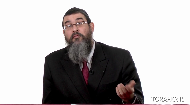 4:58
4:58
There is more enjoyment in freedom with an appreciation for the bitterness underneath. Rabbi Yossi Paltiel begins with a description of the korech procedure and then gives an interesting comparison to kreplach.
Series: Haggadah Insights
Rabbi Yossi Paltiel (56)
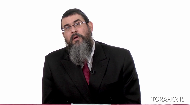 4:38
4:38
The world and our history have been full of bitterness, maror helps us remember it. Rabbi Yossi Paltiel includes the chassidic interpretation of the value of bitterness, turning it into a challenge to be overcome, as if bringing us out of slavery.
Series: Haggadah Insights
Rabbi Yossi Paltiel (56)
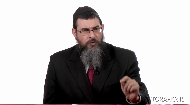 4:36
4:36
Some mitzvahs are expensive and yet they connect us to G-d. Celebrate! Rabbi Yossi Paltiel gives directions for this important part of the seder., in addition he shares chassidic insights into the calculations behind the meaning of the words.
Series: Haggadah Insights
Rabbi Yossi Paltiel (56)
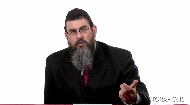 1:07
1:07
Now we wash our hands to bring holiness into ordinary food. Rabbi Yossi Paltiel gives a quick review of how to proceed.
Series: Haggadah Insights
Rabbi Yossi Paltiel (56)
 3:09
3:09
Magid is the question and answer session and children always deserve straightforward answers. Rabbi Yossi Paltiel emphasizes the importance of engaging the children in the seder and maintaining the joy of the holiday.
Series: Haggadah Insights
Rabbi Yossi Paltiel (56)
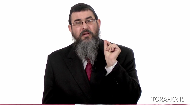 8:47
8:47
When is broken better than whole and what does it remind us of? Rabbi Yossi Paltiel explains the process and reasons for this part of the seder and illustrates the role of the broken matzah with a special story.
Series: Haggadah Insights
Rabbi Yossi Paltiel (56)
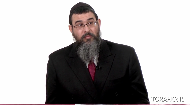 3:11
3:11
That little bit of vegetable has a big responsibility. Rabbi Yossi Paltiel emphasizes the role of the children and their questions, and aren't we all children?.
Series: Haggadah Insights
Rabbi Yossi Paltiel (56)
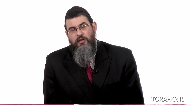 3:28
3:28
If you are going to do it, do it right. Rabbi Yossi Paltiel explains why we are washing our hands before eating a vegetable, with a brief story to illustrate his point.
Series: Haggadah Insights
Rabbi Yossi Paltiel (56)
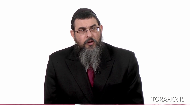 5:31
5:31
Saying Kiddush on Passover, we create the holy energy which allows us to achieve personal freedom. Rabbi Yossi Paltiel outlines the beginning of the seder and the meaning of a holiday.
Series: Haggadah Insights
Rabbi Yossi Paltiel (56)
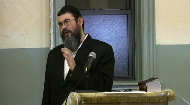 36:15
36:15
Rabbi Yossi Paltiel (56)